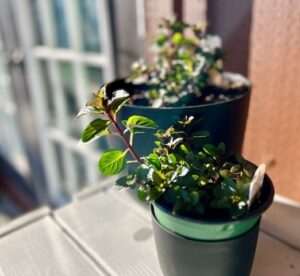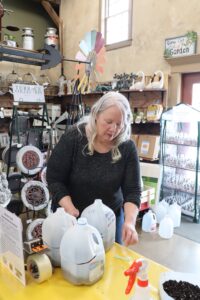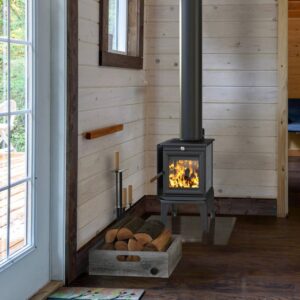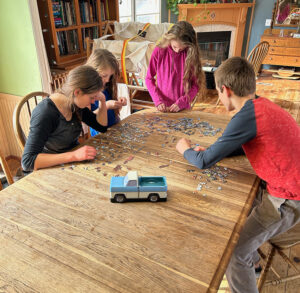Most of us feel helplessly removed from the Gulf Oil Spill aftermath. After all, what can we do, hundreds or thousands of miles away, in bucolic Amish country (or wherever you live)? We all know we should drive less and walk more; but the list below contains some ideas you might not have thought of before.
1) Switch to a push mower that is powered by none other than you. No gas, and better for your grass.
2) Plant a garden to reduce the amount of lawn that needs cutting.
3)Â Wax the floors with beeswax instead of a petroleum-based commercial wax.
4) Switch to soy-based printing inks (most are petroleum-based). Simply buying white napkins and paper towels will make a difference if we all do it. Better yet, use cloth napkins and kitchen towels.
5) Avoid plastics when possible. Use a cloth bag instead of a plastic bag; buy a wooden toy instead of a plastic toy; use a glass instead of a plastic cup; use reusable glass straws instead of the throw-away plastic kind.
6) Invest in a water filter instead of bottled water. Â
7) Buy your food fresh and in bulk from a farmer’s market. Avoid over-packaged products.
8) Even your lipstick is adding to the problem. Search for cosmetics free of petroleum based products.
9) Same with household cleaning supplies. Go natural and petroleum-free when you can (In the height of irony, Dawn dishwashing soap, being used to clean up after the BP oil spill, is a petroleum-based product.)
10) Heat with wood. Thanks to stringent air quality regulations, today’s air-tight wood stoves produce a fraction of the emissions they did back when they became popular during the energy crisis of the 1970s.
Local retailers are seeing more customers willing to reduce their dependence on oil and gas, in part because of the BP oil spill backlash. “We often see an increased interest in renewable technology, such as heating with wood, when prices increase or their is a fuel-related environmental disaster,” said Galen Lehman, president of Lehman’s in Kidron, OH. The family owned business stocks one of the country’s largest selections of wood heating and cooking stoves, as well as fireplaces and accessories, in additional to thousands of non-electric tools, gadgets, toys and appliances.
“All this talk of oil addiction reminds me of the energy crisis of the 1970s,” said Lehman. “If you have a high school graduation date of 1980 or earlier, you will remember that the energy crisis had a far reaching affect on the US economy.”
In the fall of 1973, OPEC raised oil prices by 70%, eventually imposing an oil embargo until their economic and political objectives were met. The effects of the embargo were immediate. The price of oil quadrupled by 1974, producing chaos in the Western world.
In the United States, the retail price of a gallon of gasoline rose from a national average of 38.5 cents in May 1973 to 55.1 cents in June 1974. State governments told residents not to put up Christmas lights, with Oregon banning Christmas as well as commercial lighting altogether. Politicians called for a national gas rationing program. Nixon requested gas stations to voluntarily not sell gasoline on Saturday nights or Sundays; 90% of owners complied, which resulted in lines on weekdays. Here is an interesting fact:Â Did you know that the national maximum speed limit of 55 miles per hour was imposed in 1974 to help curb America’s obsession with their cars and to reduce our dependence on oil?
Nationally, the energy crisis led to greater interest in renewable energy and spurred research in solar power and wind power. The boycott came as a shock to American drivers who had little awareness of their growing dependence on oil from the volatile Persian Gulf. But by early 1974, Americans faced fuel shortages and gasoline lines around the country.
Locally, it led to a massive sales increase for Lehman’s, a small hardware store in Amish country. Why?
[Story as told by Galen Lehman, son of founder Jay Lehman, who was in high school at the time]: “Dad had decided back in 1955 that he was going to stock black wood cooking and heating stoves to serve his Amish customers, a religious group that believes in simple living without electricity or other modern innovations. Stove manufactures, convinced that wood heat was too dated and inconvenient for their modern consumers [after all, this was 1971 — people wanted baseboard furnaces, color television and massive automobiles] were going to stop production. Because it was so important to Dad to serve his Amish customers as he had been since 1955, he convinced them to sell him a three-year supply. Quick frankly, this was a crazy decision to overstock “dated” inventory for a small businessman. However, Dad insisted. Then the energy crisis hit. Who had stoves? Lehman’s. Our three-year supply was gone in six months. And, like any good businessman, Dad reinvested in the business so he could sell more stoves to more people. It was during these early days that customers started coming from the big cities of Cleveland and Columbus, unheard of for this small hardware in rural Ohio. His goal of keeping the practical, non-electric appliances and tools in stock for his Amish customers was proving to have a much wider appeal.
Lehman’s saw much the same buying frenzy and media attention during Y2K in 1998 and 1999. And again today, people are concerned over their over-dependence on oil. but this time it is domestic oil; not foreign oil. The BP oil spill has forced many customers to look carefully at their own habits and, return, ironically in this high tech age, back to push mowers, wood burning stoves, canning supplies and drying racks. Like the old saying, what goes around…comes around.”




































I like to buy these types of things when I can. The problem is many things that help reduce our dependance cost so much. Foe me the cost is THE major factor on practicall;y everything I buy. I have developed a nerve disorder that prevents me from working anymore and so I must take this approach